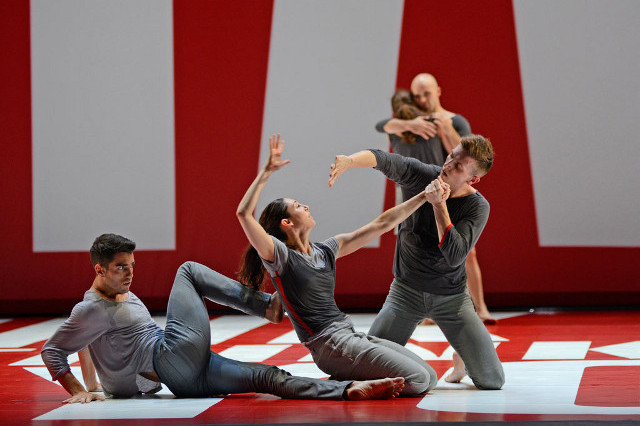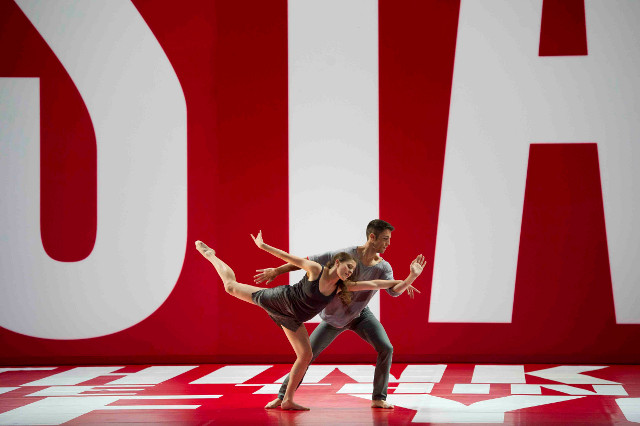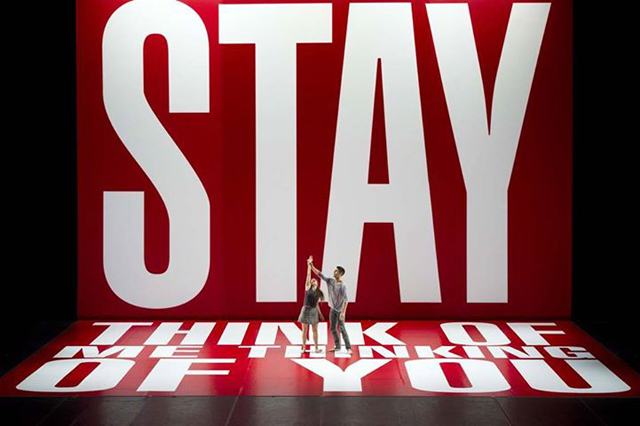Just “yes” to Benjamin Millepied‘s wonderful, calm and engaging “Reflections,” the opening work of L.A. Dance Project‘s “3 Exceptional Performances” program on view in downtown Los Angeles throughout the weekend.
More a linked chain of body-conversations than a highly kinetic dance work, “Reflections” (more unmemorable dance-titling from Millepied, the prior, “Moving Parts”), with its strong visual element, looked positively scintillating displayed on the massive stage of the former United Artists Theater. A spectacular and grandiose (in a good way) house of cinema, the theater, now “The Theatre at Ace Hotel,” was built by Chaplin, Pickford and Fairbanks in 1927. Charles Chaplin, a huge arts entrepreneur, smiles.
Five of the company’s excellent dancers delivered the work which, from program notes, appears to have been group-choreographed. Visual artist Barbara Kruger‘s cubic framing — vivid backdrop, floor matting — alternately encouraged viewers to “stay,” then “go,” but always “think of me thinking of you.” This lovely admonishment set the dance’s gentle tone. The sparse notes of David Lang‘s plaintive piano score, performed live by modern-music empress Gloria Cheng, floated upward to our splendid viewing nook in the generous first balcony. Cheng’s playing, Kruger’s rich visual overlay, and the wonderful dancing held the weighty room in a distilled moment of fine art. The outside world melted away.
“Reflections” (not “Revelations”) struck me as a game changer of sorts, as Millepied eschewed his balletic grounding and adopted in its place a cool, naturalistic movement vocabulary, infused with space, unhurried by time, dotted with lovely personal quirks. It all cohered on almost nothing. The choreography was a hugely confident partner to its music. The dance dialogue’s marvelous organic quality was rendered particularly clearly in an opening duet, a gem of choreography that unrolled, with surprising tenderness, between Morgan Lugo and Julia Eichten.
Two less “exceptional” works completed the program’s conventionally structured three-work format: “Peripheral Stream” in a “preview excerpt” with choreography, sound and visual design by Hiroaki Umeda, a pleasant-enough exploration of computer projection, dance and electronic sound that was undermined by undistinguished choreography — the “bend and stretch, reach for the sky” school of dance. Justin Peck’s “Murder Ballades,” the only neatly titled work on the program, mashed balleticisms with what can now be safely called “Millepied-isms” (cool-cat, unhurried, simple but finely tuned gestures, walks, drops to the floor, rolls, body touches) and did not add up to much. When and why does a dance “miss”? It’s hard to say but Peck’s did right from the jump.
The event rose on the excellence of the company’s dancers, the must-see venue and the adventure of watching a small troupe, albeit one birthed on a big breeze of hype, develop and build a following.
L.A. Dance Project | 3 Exceptional Performances | The Theatre at Ace Hotel Feb 20 – 22




Egad! Did we attend the same dance performance? I didn’t have anything to drink, so I was able to soberly observe the cold disconnected totally un-organic forced gestures that Millepied seemed to have “choreographed” by writing random movements on pieces of paper, threw them in a French chapeau, and had the dancers draw blindfolded. The poor dears then had to go onstage and attempt to craft meaningful connected movements out of empty gestures. It was not endearing, it was not spectacle, it was not entertaining on any level.
We were there Saturday afternoon. No expert on this style of dance, but enjoyed the artistry and obvious passion, also Gloria Cheng’s clear piano. The juxtaposition of modern dance with a Spanish Gothic performance space was wild. I took dozens of photos of the space.